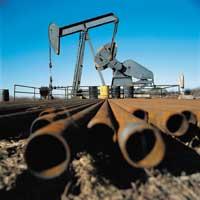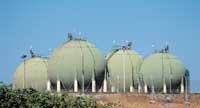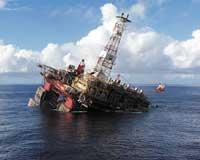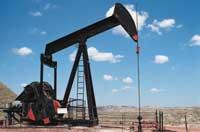Developing dependence on oil
2003/06/01 Roa Zubia, Guillermo - Elhuyar Zientzia | Rementeria Argote, Nagore - Elhuyar Zientziaren Komunikazioa Iturria: Elhuyar aldizkaria

The paints you see, resins, synthetic fabrics, plastics, rubber, many medications and many of those you consider as wood, metal or glass also originate from oil. In other words, in addition to the fuel industry, synthetic materials are based on oil. So what will happen when oil runs out?
It is clear that we need alternatives and not just to move the vehicles. What are these alternatives? Experts have written a lot on this issue, but in general, it is not possible to predict what future occupation of oil. In the beginning, the solution could be present in many areas, many are the paths that have begun to work in the energy industry. But there is still a lot of confidence in oil, so there are no clear opportunities among candidates.
In general, two large energy groups, renewable and non-renewable, should be considered. Between these two groups we have to put forces and where not, at present it is a very debated issue. The issue is in full swing because there is a basic question: Are there renewable energy sources that maintain the consumption of society? And how can we deal with the demand for raw materials demanded by the production of synthetic materials? And if not, what energy source will we exploit until it runs out?
So far, from now on
The only thing that is clear is that now is the right time to ask these questions; now, when oil has not been exhausted. Perhaps to have a starting point in this debate, we will look at the numbers.
Oil accounts for about 40% of the total energy consumed in the world. It should be noted that many countries do not use the technology of the most developed societies, so not all peoples have the same need for oil. If we take into account only developed countries, that percentage would be much higher. However, in one way or another, we talk about a very high amount of oil. So where does all that oil come from?

The largest reserves of crude oil are in the Middle East, mainly in Saudi Arabia, but also in Iran, Iraq, Qatar, Kuwait and surrounding areas. However, do not think that the largest production corresponds to these countries. The most productive are Saudi Arabia, Russia and the United States. It must be remembered that oil production gives these large producers the ability to decide prices on the market, with the consequent control of the world economy.
On the other hand, it should be noted that the United States is the largest consumer in the world, since only they use a quarter of total production. Europe is not left behind: Consume around 20%. And other countries, like Japan, have to be included in this list, although the list is not very long: few countries consume most of the oil.
Looking ahead
And in the future, what? In general, consumption is increasing and thus dependence, which is expected to double by 2020. This effect is due to two factors: developed countries, increasingly consumed, and developing countries, due to the growing demand for oil. Global population growth translates into a growing need for energy.
Let us now look at the other end of the rope, in order to combat its dependence on oil prices, the rich countries are driving technological development. In view of the data, this effort seems banal, but most people are looking for a more efficient use of oil. To make the most of the oil burning, the technology continues to improve.

But efficiency is not the sole responsibility of the industry. Society also plays a role in this process, among other aspects, as recycling and waste treatment progresses, reliance on raw material decreases. And all this, in part, is the responsibility of the street consumer.
Efforts to increase efficiency cannot end this dependence. However, it is evident that these efforts are accentuated as the price of the barrel of oil increases. And this or not, when oil reserves begin to run out, studies of alternative fuels will increase. You will need it.
Oil owners are not standing nor will they be. Despite the constant price of the product, techniques are being developed capable of exploiting oil deposits until the last drop and continue to look for new wells.
Oil-free chemistry
Are we going to do chemical synthesis when oil runs out? Yes, of course, oil is not the only source of chemical compounds. However, it is true that much of the chemical industry comes from petroleum products, mainly polymer chemistry.
Polymers are giant molecules that can contain millions of atoms; in the laboratory, they synthesize small molecules chained one after another. It is where oil is, small molecules that, in most cases, are extracted from oil. Controlling size, shape, etc. of the chain they obtain, certain characteristics can be given to the final material. In addition, there are several additives that help modify the properties of the final product.
In addition to the initial molecules, all the substances that add them are in origin petroleum or chemical transformation of those extracted from oil. These chemical transformations are also made through other products of the same origin. Therefore, dependence is total.

But what will happen when raw materials are exhausted? Where will the whole industry come from?
Where will it be?
Many chemicals are extracted from plants and extracted. But it is an expensive and complex process, suitable for obtaining small amounts of certain substances, but not enough to contain the consumption of society.
We will have to look for other solutions and there are already innovative ideas. However, most ideas are not feasible because they are too expensive and, at the moment, oil offers a much cheaper alternative to obtaining chemicals.
But oil is running out… or not? No one knows how much oil is left. All opinions are speculative. Also, if someone knows what is left, the oil companies know it. However, oil companies will not recognize everything they know. Many scientists believe there is more oil than declared, but companies will not say where or how much there is.
However, production will once be reduced. What will happen then?
C1 Chemistry

Not only is oil extracted from the subsoil, but natural gas is also extracted. For example, in many reserves of the North Sea oil is extracted and in many others natural gas is extracted (see map of page 28). In short, gas and oil have the same origin, but gas is mostly methane, that is, the lightest hydrocarbon, and is concentrated in large gas bags, in vaulted geological structures.
Gas comes from oil, through a process that lasts thousands of years. Oil has at first large molecules with many carbon atoms, which break slowly. The longer it spends in the subsoil, the smaller the molecules, that is, with the passage of time less and less carbon atoms are generated, and in some oil deposits predominate the carbon monoatoms molecules, methane.
Methane is an organic molecule that can undoubtedly be interconnected by known organic reactions and form many other compounds, which are called C1 chemistry. Of course, regarding the current situation, this process is also expensive, but in the future we will have to see it.
Some consider that the chemistry of C1 can replace oil in the raw materials of chemistry, at least until natural gas is exhausted. Even knowing that this resource is also going to run out, you could expand the search term for a solution. Yes, but how long? At least we would have the opportunity to seek new solutions. Then futures, and it is difficult to say how the futures will be.
Undo polymers

There are other and current solutions. The technology is already underway. As for materials, it is an example of this technology for the extraction of original polymer components. If these giant molecules have been made from small molecules, is it not possible to break down giants and recover original small molecules? For it is possible, for it technology has been launched. It's the same idea as recycling, but instead of recycling materials, material components can be recycled.
The idea is very good, as millions of polymeric materials are lost among the waste we currently deposit. The raw material would be waste. However, the limit is always, the price of the process. In Germany this process was tested and the result was not very good: for the polymer to be interesting to 'depolymerize', the oil tank should be sold at approximately 40 dollars. Markets will pass many years earlier.
Are renewable energies an alternative?
Renewable energies have also been called alternative energies, but it is not yet clear whether they are a real alternative to oil. The doubt is there, will they be able to meet the current energy demand?

No. Most believe so. The truth is that it is difficult to imagine a world without oil. Faced with this, some people think that the only solution will be to reduce consumption. But are we willing to endanger our “quality of life” or, rather, our lifestyle as comfortable as the consumer? Difficult.
Researchers and technicians who have worked on the development of renewable energies have had to fight this current. Look back. Who would say that twenty years ago wind energy would be profitable? Or that in our hamlets the water would be heated with solar panels? Few. And we have the results in sight.
Given that so far little work has been done on the study of renewable energy, what would have happened if 50 years ago we had been fully involved in these research? Would we depend on oil? Would we have the same consumption habits?

Gai honi buruzko eduki gehiago
Elhuyarrek garatutako teknologia






